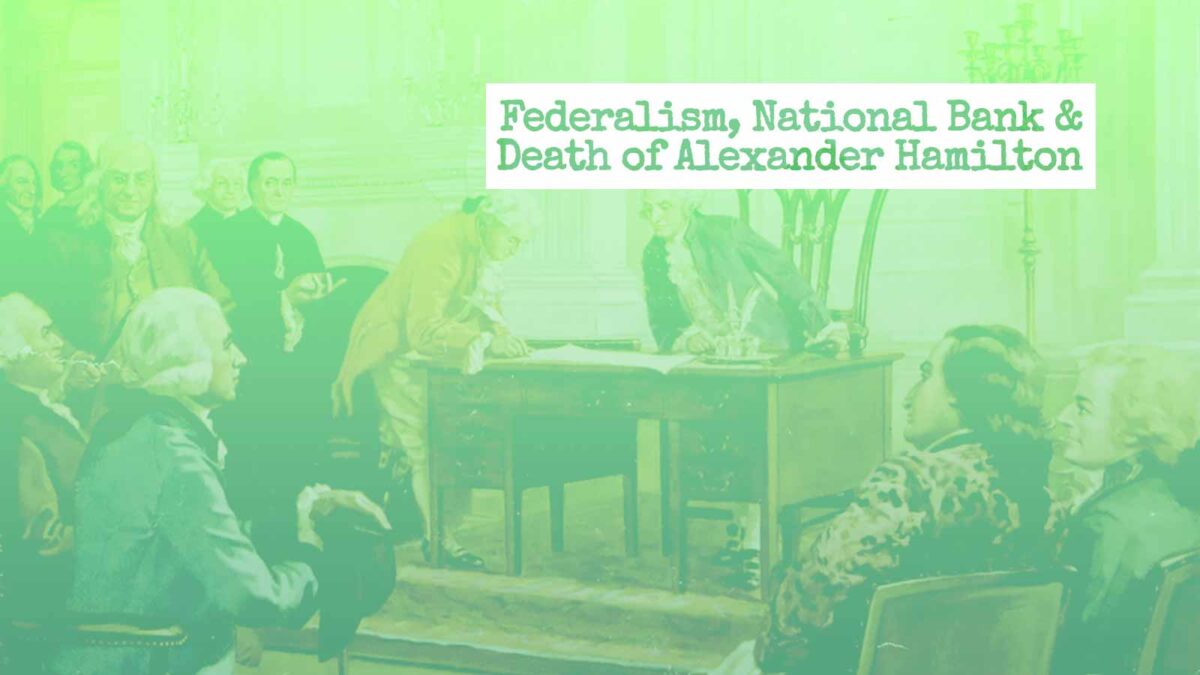Until 1800, when Federalist influences were finally wiped clean, our blemished nation remained, in great need of civil restoration. Federalist rule had hindered our many prospects as a new thriving country. As a society we were viewed as “ignorant and incapable of self-government” by the sightless Federalist canon. Jeffersonian rule was instated in 1801, finally restoring our long lost civil liberties. Symbolically ending widespread Federalist rule, the death of Alexander Hamilton occurred several years later in 1804. This event was the overdue affair that ended Hamilton’s ideas and those of the Federalist Party.
Life under Federalist rule in the late 1700s was not an ordinary cup of tea (I verified this statement with Gordo.) John Adams, and his Federalist regime felt that all power should lie invested in a central government, leaving the people with very little say. We the people were viewed simply as a group that could be manipulated to fit the needs of the almighty government.
“Take mankind in general, they are vicious—their passions may be operated upon… Take mankind as they are, and what are they governed by? Their passions. There may be in every government a few choice spirits, who may act from more worthy motives. One great error is that we suppose mankind more honest than they are. Our prevailing passions are ambition and interest; and it will be the duty of a wise government to avail itself of those passions, in order to make them subservient to the public good.”
These statements made by Federalist powers in 1787 sums up the ghastly way the common people were viewed during this time period.
Through such fascist ideas as the “National Bank” and the “Perpetual President,” our civil liberties were soon stripped from our backs. The Hamiltonians felt that the government should benefit the wealthy and that it should be designed to serve them. On account of these beliefs, John Adams created schemes that would serve his affluent class while disadvantaging proletarian society.
The Hamiltonian proposed “National Bank” was one such example. This bank would control funds for the government and would pool ‘capital for economic development.’ This plan greatly benefited Northern states (many Hamiltonians were ‘merchants, bankers, manufacturers, or professional men from New England and the Atlantic seaboard’) while stifling dominantly Jeffersonian agricultural societies in the south. In the early months of 1791, the bill for the bank was passed by congress despite uneven demand for such an institution.
Not only did govern below Federalist influences include such ridiculous features as these, but the Hamiltonian Foreign policy was also in a state of great discourse. Wishing to obtain the aristocratic system of Great Britain, Hamiltonians pledged loyalty to the crown, disregarding their debt to France for its allegiance in 1778. The Hamiltonian government came up with such accords with England as ‘Jay’s Treaty,’ which basically insulted our society with outrageous agreements between our two countries.
With the turn of the century, Jefferson was finally brought into office through the events of the Revolution of 1800. Most federalist ideals were soon expelled and Jefferson (and his posse) soon purified our government. Our Nation’s liberties were rapidly restored and the tyrannical aspects of the Federalist Party no longer oppressed the people. Not too far into Jefferson’s term however, the death of Alexander Hamilton occurred on account of a gun wound presented to him by Aaron Burr, Vice President of the United States.
This event, a duel, was brought on by derogatory comments from Hamilton regarding Burr (a rival from before grade school.) Burr challenged Hamilton to a shootout, which ended in his favor. Burr then fled, forfeiting his vice-presidency. Emblematically, the event represents the many feuds between Federalist and Jeffersonian powers that occurred over several decades towards the end of the 18th century.
The death of Alexander Hamilton came three years after the fall of the Federalist Party. Vice President Aaron Burr fled to the Louisiana Territory. The Jefferson Party mobilized to bring justice and liberate society using lessons learned from the Federalist era.

